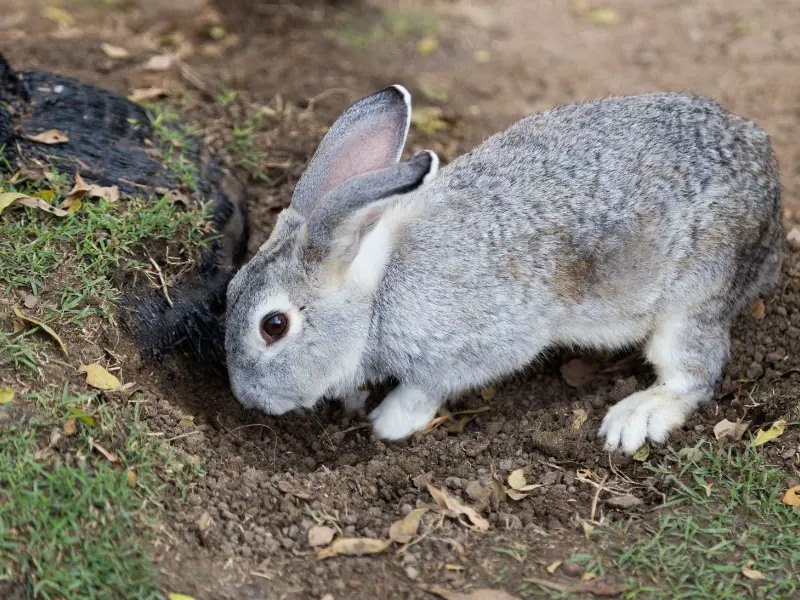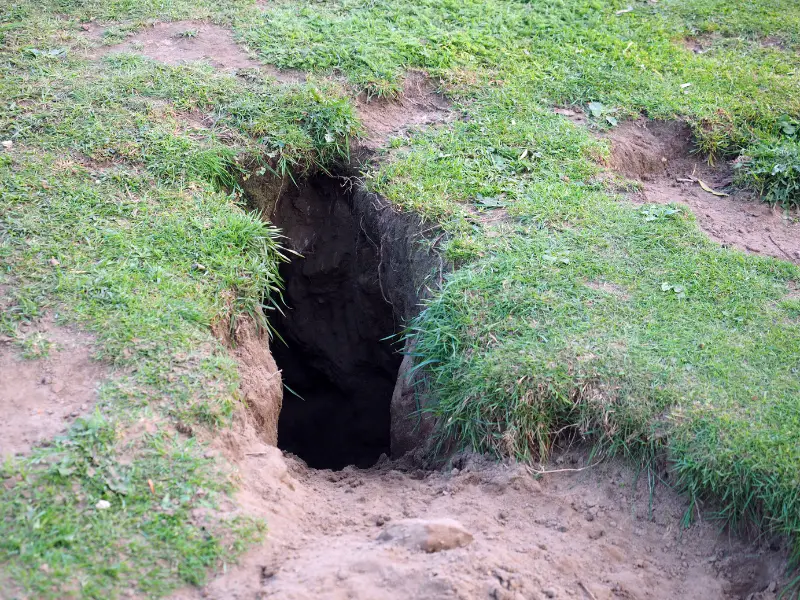Have you ever taken your bun outside to play (in a protected playpen) to get some fresh air, only to return and find the beginnings of a deep hole in your freshly laid lawn? Even though you cover the hole, your rabbit easily finds the weak spot and keeps digging.
But why is your domestic bun doing this, and do rabbits live in holes?
Wild rabbits live in holes known as burrows. The burrows provide shelter and protection from the elements and predators. The holes also provide a safe place for them to kindle (give birth) their litter. Hares prefer to make a shallow shelter above ground that looks like a nest.
If you’d like to learn more about the digging habits of your floppy-eared friend, then this guide will provide you with all the information you’ll need.
Where Do Rabbits Live?
Domestic rabbits, wild rabbits, and hares have very different living arrangements and preferences based mainly on their survival. Let’s take a closer look at where rabbits live:
Domestic Rabbits
Your bun has no need to evade predators or find shelter from the elements like wild rabbits do. Depending on your setup at home, your bun might live in the:
- An outdoor hutch or enclosure that has an accessible run for exercise.
- An indoor hutch inside your home that has a designated play area.
- A vacant room in your house that is only for your bun to live in, and it’s sufficiently rabbit-proof to keep your bun safe.
- Your bunny is a free-roam rabbit that lives in your house with no cages or enclosures but your house is a safe space for them to go where its heart desires.
Wild Rabbits
Wild rabbits must fend for themselves, unlike a domesticated rabbit’s sheltered life. This includes finding suitable places to hide.
Wild rabbits are good at running away from predators and prefer areas with shrubs and trees for coverage (such as woods, grasslands, or meadows.)
These rabbits will dig and tunnel into the ground to create a network of burrows (also known as a warren) with multiple exits (in case a predator comes sniffing around.)
Did you know? The cottontail rabbit, native to Jackson Hole (a town) in Wyoming, hides in holes and burrows dug by other animals. This rabbit uses the dens of gophers and marmots to hide from predators and to keep warm during winter.
Hares
Hares don’t live in holes; they have strong hind legs that allow them to sprint away from predators and danger. Hares prefer to live in an open farm and grassland areas without trees.
This species lives a nomadic life and prefers to scrape a shallow indentation into the soil (known as a form) where they sleep. Hares flatten their long ears so they can’t be spotted by predators when lying in the long grass.
It’s easy to mistake a sleeping hare for a pile of hay. By not living in a hole, the hare has a better chance of escaping if a predator does find them.
Why Do Rabbits Dig Holes?

Although digging is an instinctive and normal behavior for rabbits, there are a few other reasons why rabbits dig holes. Let’s take a closer look:
1. Sadly for your lawn, your bun digs for fun, and they enjoy it. It’s normal to find your bunny’s paws and face covered in soil and binky-ing (a sign that they’re happy).
2. Wild rabbits dig holes to create burrows to live in. These tunnels keep them safe from predators and the elements. It’s also the perfect place to store food.
3. Some rabbits (even domestic rabbits) will dig a hole on a hot day to cool down. The soil under the ground is damp and cool.
4. Wild rabbits will dig holes to reach food such as roots and vegetables (especially during the winter.)
5. A pregnant doe (female rabbit) will dig a hole to create a nest for when they kindle their litter. Domestic rabbits have the same instinct and will start pulling fur from their body and digging holes when the time for kindling approaches.
6. Another reason rabbits dig holes is if they’re bored. It’s an almost therapeutic way for them to deal with their frustration. This can become a bad habit.
Did you know? Rabbits are very clever, and they know if they start digging in the garden, you’ll rush over to stop them. Buns often do this to get your attention.
How Deep Is a Rabbit’s Hole?
Wild rabbits live in social groups, and their burrows must accommodate anything from 2 rabbits to 30 rabbits. Typically, the depth of a standard rabbit hole can reach around 10 ft deep with tunnels spreading out to about 150 ft.
The depth of the rabbit hole also depends on the area they have chosen to dig their holes. You can find rabbit holes in places like:
- Deserts
- Grasslands
- Meadows
- Forests
- Small woods
- Gardens
- Vegetable patches
Do Rabbits Live Underground?
Not all species of rabbits live underground. Wild rabbits live in social groups underground, while hares prefer to live in shallow nests on the surface.
Cottontail rabbits hide underground, but they don’t live underground.
Interestingly, gophers, badgers, and water voles are exceptional burrow diggers and also live underground.
Do Pet Rabbits Dig Holes?
Even though your floppy-eared friend has been domesticated, pet rabbits still have the instinct to dig. Your bun may start digging holes if:
- They are bored or frustrated.
- They are feeling hot and need to cool down.
- They are in a playful mood and digging makes them happy.
- They are feeling territorial.
- They are simply just looking for some attention.
My Last Bunny Thoughts
As we have seen, some rabbits do live in holes underground, while others prefer to live above ground. While your sweet bunny doesn’t live in holes underground, if they continuously dig holes in your garden, you may need to pay closer attention to their living area.
Your bun may be frustrated, and the digging is helping them deal with their irritation. Another reason your bun may be digging is that they’re stressed and are trying to hide away from a certain noise or pet.
Ensure your bun has plenty of toys or straw mats to keep them mentally stimulated and spend a few hours with them daily. This should help curb the digging habit.
Related Articles:

